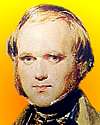 (source)
(source)
|
Charles Darwin
(12 Feb 1809 - 19 Apr 1882)
English naturalist who presented facts to support his theory of the mode of evolution whereby favourable variations would survive which he called 'Natural Selection' or 'Survival of the Fittest.'
|
Charles Darwin - This…I call Natural Selection, or the Survival of the Fittest
Illustrated Quote - Medium (500 x 350 px)
More Charles Darwin quotes on science >>
Context of Charles Darwin’s “This…I call Natural Selection, or the Survival of the Fittest” quote.
In Chapter 4 of his On the Origin of Species, Charles Darwin explained the significance of “Natural Selection” that was in the book's subtitle: “by Means of Natural Selection; or, The Preservation of Favoured Races in the Struggle for Life.” As originally published in 1859, the chapter began as shown below. Note that the phrase “or the Survival of the Fittest” did not appear until 1869. In each subsequent edition after the first, Darwin continued to edit some punctuation, refine words and phrases, and add new material. Most of those edits are not indicated below, except there is merged herein the “or the survival of the fittest” phrase in brackets added by Darwin in 1869 for the fifth edition):
“HOW will the struggle for existence, discussed too briefly in the last chapter, act in regard to variation? Can the principle of selection, which we have seen is so potent in the hands of man, apply in nature? I think we shall see that it can act most effectually. Let it be borne in mind in what an endless number of strange peculiarities our domestic productions, and, in a lesser degree, those under nature, vary; and how strong the hereditary tendency is. Under domestication, it may be truly said that the whole organisation becomes in some degree plastic. Let it be borne in mind how infinitely complex and close-fitting are the mutual relations of all organic beings to each other and to their physical conditions of life. Can it, then, be thought improbable, seeing that variations useful to man have undoubtedly occurred, that other variations useful in some way to each being in the great and complex battle of life, should sometimes occur in the course of thousands of generations? If such do occur, can we doubt (remembering that many more individuals are born than can possibly survive) that
On the other hand, we may feel sure that any variation in the least degree injurious would be rigidly destroyed. This preservation of favourable variations and the rejection of injurious variations, I call Natural Selection. [or the Survival of the Fittest.] Variations neither useful nor injurious would not be affected by natural selection, and would be left a fluctuating element, as perhaps we see in the species called polymorphic.”
By the third edition (1861), to answer issues that had arisen since the original publication, Darwin extended the paragraph with the following:
“Several writers have misapprehended or objected to the term Natural Selection. Some have even imagined that natural selection induces variability, whereas it implies only the preservation of such variations as occur and are beneficial to the being under its conditions of life. No one objects to agriculturists speaking of the potent effects of man's selection; and in this case the individual differences given by nature, which man for some object selects, must of necessity first occur. Others have objected that the term selection implies conscious choice in the animals which become modified; and it has even been urged that as plants have no volition, natural selection is not applicable to them! In the literal sense of the word, no doubt, natural selection is a misnomer; but who ever objected to chemists speaking of the elective affinities of the various elements? — and yet an acid cannot strictly be said to elect the base with which it will in preference combine. It has been said that I speak of natural selection as an active power or Deity; but who objects to an author speaking of the attraction of gravity as ruling the movements of the planets? Every one knows what is meant and is implied by such metaphorical expressions; and they are almost necessary for brevity. So again it is difficult to avoid personifying the word Nature; but I mean by Nature, only the aggregate action and product of many natural laws, and by laws the sequence of events as ascertained by us. With a little familiarity such superficial objections will be forgotten.”
Quotes on | Evolution | Natural Selection | Origin of Species | Survival of the Fittest | Variation |
- Science Quotes by Charles Darwin.
- 12 Feb - short biography, births, deaths and events on date of Darwin's birth.
- Charles Darwin - Earthquake observation on 20 Feb 1835, during the voyage of the Beagle.
- Charles Darwin - context of quote “If the misery of our poor be caused not by the laws of nature…” - Medium image (500 x 350 px)
- Charles Darwin - context of quote “If the misery of our poor be caused not by the laws of nature…” - Large image (800 x 600 px)
- Charles Darwin - context of quote “Improving…a young naturalist” - Medium image (500 x 350 px)
- Charles Darwin - context of quote “Improving…a young naturalist” - Large image (800 x 600 px)
- Charles Darwin - context of quote “Great is the power of steady misrepresentation” - Medium image (500 x 350 px)
- Charles Darwin - context of quote “Great is the power of steady misrepresentation” - Large image (800 x 600 px)
- Charles Darwin - context of quote “This…I call Natural Selection, or the Survival of the Fittest” - Large image (800 x 600 px)
- Letter to Asa Gray - from Charles Darwin (5 Sep 1857).
- From So Simple a Beginning: Darwin's Four Great Books, by Charles Darwin, Edward O. Wilson. - book suggestion.
- Booklist for Charles Darwin.
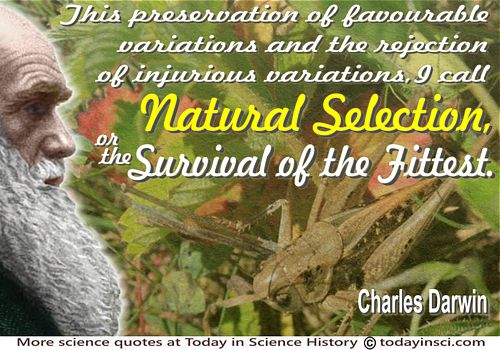
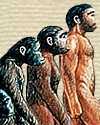
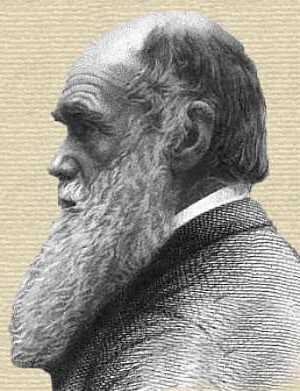

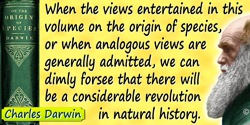
![Charles Darwin quote: About weak points [of the Origin] I agree. The eye to this day gives me a cold shudder, but when I think o](https://todayinsci.com/D/Darwin_Charles/DarwinCharles-WeakThm.jpg)




